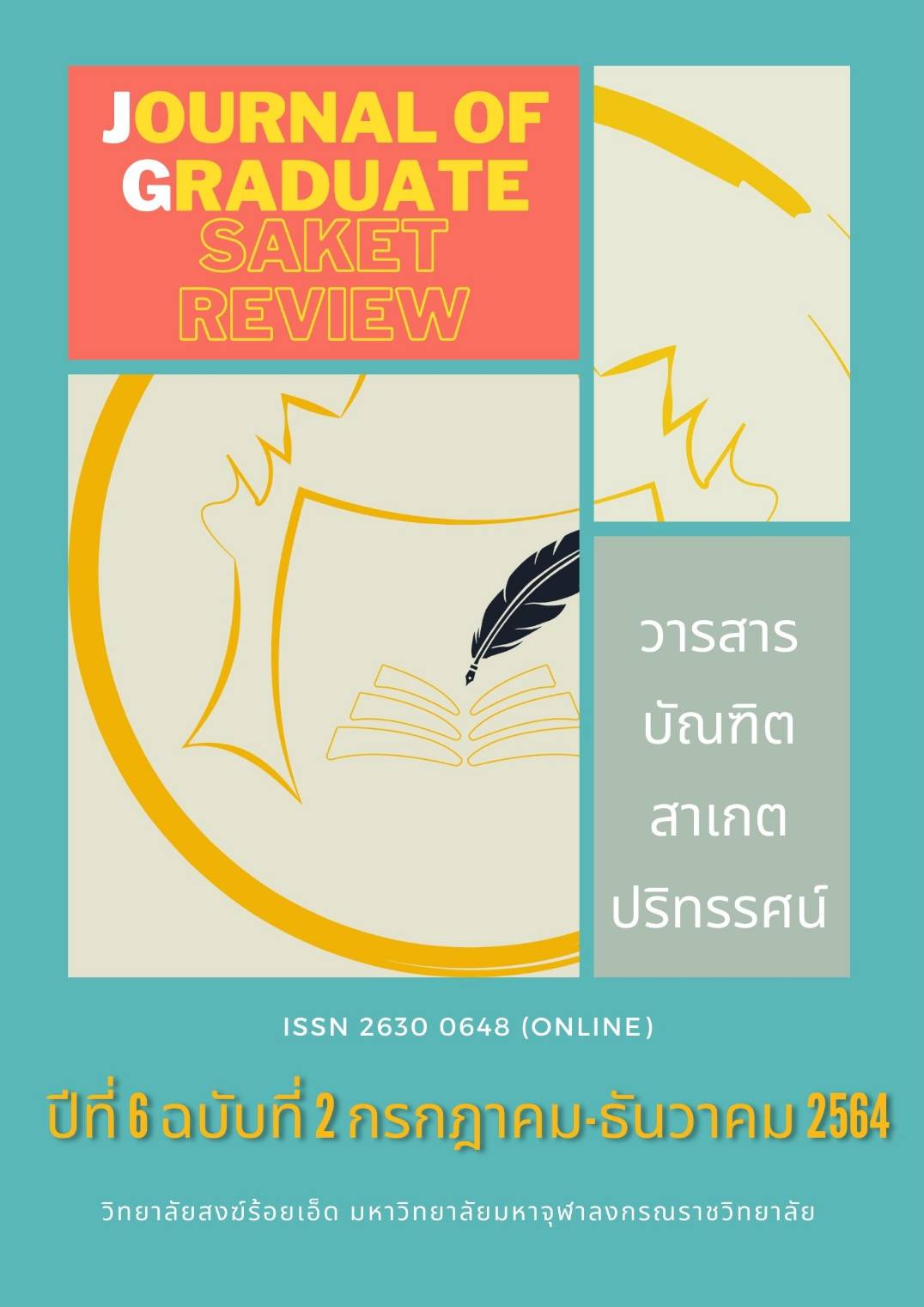การพัฒนาอารมณ์ตามแนวพุทธจิตวิทยาในสังคมชีวิตวิถีใหม่
Main Article Content
บทคัดย่อ
บทความนี้มีวัตถุประสงค์เพื่อศึกษาการพัฒนาอารมณ์ตามแนวพุทธจิตวิทยาในสังคมชีวิตวิถีใหม่ พบว่าระบาดของไวรัสโคโรนา 2019 (Covid-19) ทำให้เกิดการเปลี่ยนแปลงวิถีการดำเนินชีวิตของสังคมมนุษย์เป็นอย่างมาก ภายใต้มาตรการการป้องกันโรคระบาด การสรรหาวิธีการดำเนินชีวิตเพื่อความอยู่รอดทำให้เกิดการเปลี่ยนแปลงในหลายพฤติกรรมของผู้คนในสังคม จนกลายเป็นชีวิตวิถีใหม่ New Normal ซึ่ง รูปแบบชีวิตวิถีใหม่นี้ ประกอบด้วย วิธีคิด วิธีเรียนรู้ วิธีสื่อสาร ส่งผลต่อภาวะทางอารมณ์ที่มีต่อตนเองและบุคคลอื่นหรือสิ่ง ซึ่งในสภาวการณ์นี้อารมณ์ที่เกิดขึ้นส่วนใหญ่จะเป็นอารมณ์ในด้านลบ เช่น รู้สึกผิดหวัง ท้อแท้ ห่อเหี่ยว บึ้งบูด หงุดหงิด อันจะมีผลต่อสภาพจิตใจ และการแสดงออกทางสังคม การปรับตัวให้เข้ากับชีวิตวิธีใหม่ของคนในสังคมจึงมีความจำเป็นต้องพัฒนาอารมณ์ของบุคคลให้สามารถรับสภาพกับวิถีชีวิตใหม่ได้ โดยอาศัยหลักพุทธจิตวิทยา เป็นเครื่องมือในการพัฒนาด้านอารมณ์และจิตใจ หลักการพัฒนาอารมณ์ตามแนวพุทธจิตวิทยาในสังคมชีวิตวิถีใหม่ โดยสรุปมี 3 ประการ คือ 1.การใช้สติ กำกับ ควบคุมอารมณ์ ตลอดเวลาตามความเป็นจริงตามสภาวะของมันโดยเฉพาะ การรู้จักอารมณ์ตนเอง จะเป็นพื้นฐานในการควบคุมอารมณ์ เพื่อแสดงออกอย่างเหมาะสม 2.การใช้ปัญญา คือ จะต้องมีการพัฒนาตนให้มีปัญญาเป็นแกนกลางของอารมณ์ ได้แก่ การพัฒนาความรู้ความเข้าใจความคิดเห็นถูกต้องดีงาม เกื้อกูลแก่ชีวิตและสังคม และมีความรู้ความเข้าใจตามสภาวะของมัน และ 3.การใช้หลักโยนิโสมนสิการ คือ การคิดหาเหตุปัจจัย สืบค้นถึงต้นเค้า สืบสานตลอดสายแยกแยะออกให้เห็นตามสภาวะโดยไม่เอาตัณหาอุปาทานของตนเข้าไปจับ เป็นการพัฒนาอารมณ์ด้วยการคิดแบบสาวหาเหตุปัจจัย
Article Details
เนื้อหาและข้อมูลในบทความที่ลงตีพิมพ์ในวารสารบัณฑิตสาเกตปริทรรศน์ ถือเป็นข้อคิดเห็นและความรับผิดชอบของผู้เขียนบทความโดยตรงซึ่งกองบรรณาธิการวารสาร ไม่จำเป็นต้องเห็นด้วย หรือร่วมรับผิดชอบใด ๆบทความ ข้อมูล เนื้อหา รูปภาพ ฯลฯ ที่ได้รับการตีพิมพ์ในวารสารบัณฑิตสาเกตปริทรรศน์ ถือเป็นลิขสิทธิ์ของวารสารบัณฑิตสาเกตปริทรรศน์ หากบุคคลหรือหน่วยงานใดต้องการนำทั้งหมดหรือส่วนหนึ่งส่วนใดไปเผยแพร่ต่อหรือเพื่อกระทำการใด ๆ จะต้องได้รับอนุญาตเป็นลายลักอักษรจากวารสารบัณฑิตสาเกตปริทรรศน์ ก่อนเท่านั้น
เอกสารอ้างอิง
กรมสุขภาพจิต. (2564). สืบค้นจาก : https://www.dmh.go.th/news/view.asp?id=2288
กระทรวงการอุดมศึกษา วิทยาศาสตร์ วิจัยและนวัตกรรม. (2564). สืบค้นจาก : https://www.mhesi.go.th/
คณะการแพทย์แผนไทย มหาวิทยาลัยสงขลานครินทร์. (2564). สืบค้นจาก :
http://www.ttmed.psu.ac.th/blog.php?p=258
พระครูกัลยาณสิทธิวัฒน์.(2556). พุทธจิตวิทยากับการพัฒนาอารมณ์. กรุงเทพมหานคร : โรงพิมพ์มหาจุฬาลกรณราชวิทยาลัย.
พระพรหมคุณาภรณ์ (.ป.อ.ปยุตฺโต) (2554). พจนานุกรมพุทธศาสตร์ ฉบับประมวลศัพท์. กรุงเทพฯ : ธรรมดา
_______________ (ป.อ.ปยุตฺโต). (2550). วิธีคิดตามหลักพุทธธรรม. กรุงเทพมหานคร : บันลือธรรม
มหาจุฬาลงกรณราชวิทยาลัย.(2535). พระไตรปิฎกภาษาไทย. กรุงเทพมหานคร : โรงพิมพ์มหาจุฬาลงกรณราชวิทยาลัย.
ศรีสารถี. พุทธจิตวิทยา. (2564). สืบค้นจาก : http://www. Vcharkarn.com/vblog/5519/6
สถาบันส่งเสริมความปลอดภัย อาชีวอนามัย และสภาพแวดล้อมในการทำงาน(องค์การมหาชน). (2564). สืบค้นจาก : http://www.tosh.or.th/covid-19/index.php/new-normal
สำนักงานคณะกรรมการสุขภาพแห่งชาติ. (2560). การขับเคลื่อนธรรมนูญว่าด้วยระบบสุขภาพแห่งชาติ รากฐานการจัดวางอิฐก้อนแรกของระบบสุขภาพพึงประสงค์.กรุงเทพฯ: บริษัท มาตาจำกัด.
Kretch and Crch-freld อ้างถึงใน สุขา จันทน์เทศ. (2555). จิตวิทยาการศึกษา. กรุงเทพมหานคร : แพร่พิทยา.


